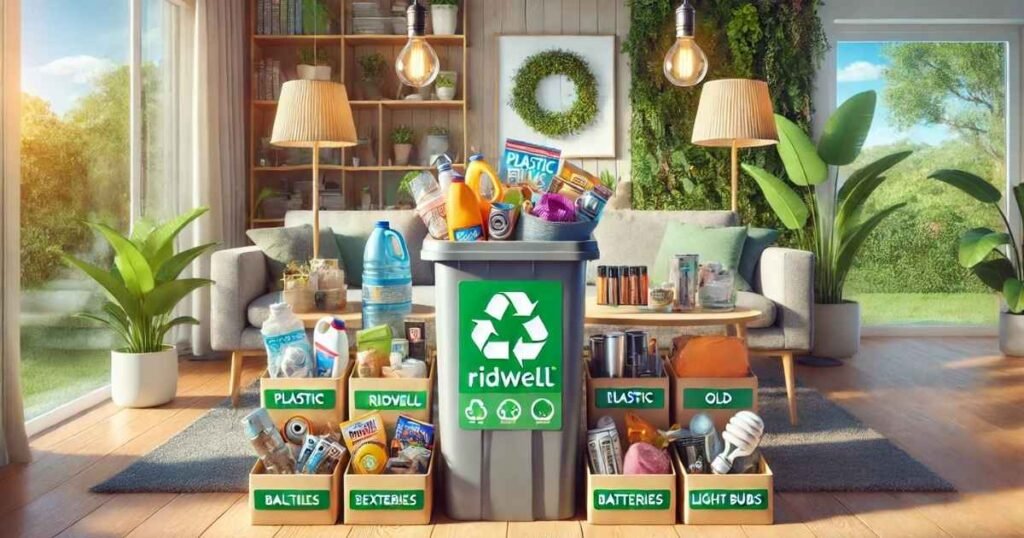Introduction: What is Ridwell?
In today’s world, where sustainability is no longer an option but a necessity, companies like Ridwell are making it easier for households to reduce waste and live more eco-friendly lives. Founded with the mission to promote sustainability, Ridwell is changing the way we think about waste management. It offers a convenient service that helps families recycle items that are often ignored by traditional curbside recycling programs.
But what exactly is Ridwell and how can it help you make a positive impact on the environment? This comprehensive guide will delve into everything you need to know about Ridwell—from how it works to its benefits for your household and the planet.
The Story Behind Ridwell
Ridwell began as a simple idea between a father and son in Seattle who were looking for ways to responsibly dispose of hard-to-recycle items. They realized that there were numerous household items that couldn’t be recycled through regular curbside services. So, they set up a collection system to keep these items out of landfills. What started as a small neighborhood initiative soon grew into a thriving company, driven by the desire to make sustainability accessible to everyone.
Today, Ridwell serves multiple cities, helping thousands of families recycle responsibly. Their mission remains clear: to reduce waste and inspire communities to take small but significant steps towards a more sustainable future.
How Does Ridwell Work?
If you’re interested in how Ridwell operates, the process is both simple and efficient:
- Sign Up for a Subscription: To get started, visit the Ridwell website and sign up for a subscription that fits your household’s needs. New users receive a welcome kit that includes a collection bin and special bags for sorting items.
- Sort Your Recyclables: Ridwell accepts a variety of items that can’t be recycled through traditional means. These include plastic films, old textiles, batteries, light bulbs, and electronics. Place these items in the designated bags provided.
- Scheduled Pick-Ups: Every two weeks, Ridwell collects your sorted items directly from your doorstep. Subscribers are notified ahead of time so they can prepare their bins for collection.
- Responsible Recycling and Repurposing: The items collected are taken to partners who specialize in recycling or repurposing them. This ensures that nothing goes to waste.
Ridwell’s streamlined process makes it easy for anyone to participate in sustainable waste management, even if they lead busy lives.
Why Ridwell Matters: The Benefits of Sustainable Recycling
Choosing Ridwell isn’t just about reducing the clutter in your home—it’s about making a meaningful impact on the environment. Here’s why Ridwell’s service is becoming a staple for eco-conscious households:
1. Reducing Landfill Waste
Many household items, such as plastic bags, light bulbs, and batteries, often end up in landfills because they’re difficult to recycle. Ridwell provides a solution by ensuring these materials are properly handled and repurposed.
By diverting these items from landfills, Ridwell helps reduce the environmental impact of waste. This is crucial because improperly disposed waste can release harmful chemicals into the soil and water, affecting ecosystems and public health.
2. Supporting a Circular Economy
Ridwell’s approach goes beyond recycling; it supports the concept of a circular economy, where materials are reused instead of being discarded. For instance, textiles collected by Ridwell are repurposed into insulation, while old electronics are refurbished or safely dismantled.
This not only saves valuable resources but also reduces the demand for new raw materials, lowering the carbon footprint associated with manufacturing.
3. Promoting Community Engagement
One of the unique aspects of Ridwell is its focus on community involvement. By participating in Ridwell’s program, households are not just disposing of waste—they’re joining a movement toward a more sustainable lifestyle. Ridwell also partners with local non-profits, ensuring that reusable items like clothes or old electronics find a second life.
What Can You Recycle with Ridwell?

The range of items Ridwell accepts is one of its standout features. Here’s a breakdown of what you can recycle:
Plastic Films
Plastic films, such as grocery bags, shrink wrap, and bubble wrap, are notorious for clogging recycling systems. Ridwell collects these items separately and sends them to facilities that specialize in recycling soft plastics.
Textiles
Old clothes, linens, and towels that are too worn to donate can be collected by Ridwell. Instead of ending up in landfills, these items are transformed into new products or recycled into raw materials.
Light Bulbs and Batteries
Items like light bulbs and batteries contain hazardous chemicals that should not be thrown in the trash. Ridwell ensures that these items are disposed of safely, preventing environmental contamination.
E-Waste
Got old gadgets collecting dust? Ridwell accepts small electronics, helping you clear out your space while making sure e-waste is processed responsibly.
The Environmental Impact of Using Ridwell
By using Ridwell, you’re not just clearing out your junk drawer—you’re actively contributing to a healthier planet. Consider this:
- Ridwell has already diverted millions of pounds of waste from landfills.
- Their partnerships with local organizations ensure that items are reused, repurposed, or recycled efficiently.
- Every item collected is tracked, giving subscribers peace of mind knowing exactly how their waste is being handled.
Ridwell’s commitment to transparency sets them apart. Their website provides detailed reports on how collected items are processed, ensuring that subscribers can trust where their waste is going.
How to Get Started with Ridwell
If you’re ready to make a difference, signing up for Ridwell is quick and easy. Visit their official website and choose a subscription plan. Once you sign up, you’ll receive your welcome kit, including a bin and sorting bags. Ridwell’s intuitive system is designed to fit seamlessly into your routine, making it easy to stay consistent with sustainable practices.
Ridwell Pricing and Membership Plans
Ridwell offers flexible membership plans to accommodate different households. While pricing may vary depending on your location, the service is designed to be affordable. Most plans include bi-weekly pick-ups, ensuring that you always have a way to dispose of items responsibly.
Customer Testimonials: What Users Are Saying About Ridwell
“Ridwell has been a game-changer for our household. We no longer feel guilty about tossing out things like batteries or plastic bags. It’s so easy!” – Emily D.
“The best part is knowing that my waste is being recycled properly. Ridwell’s transparency makes me feel good about where my items are going.” – John P.
“I love that Ridwell partners with local charities. It’s not just recycling; it’s supporting the community.” – Sarah L.
Frequently Asked Questions (FAQs)
What items can I recycle with Ridwell?
Ridwell accepts a wide variety of items, including plastic films, textiles, light bulbs, batteries, and e-waste.
How often does Ridwell collect items?
Ridwell offers bi-weekly collections, making it convenient for households to stay on top of their recycling.
Is Ridwell available in my area?
Ridwell is expanding rapidly, so check their website to see if they serve your location.
Can I cancel my subscription at any time?
Yes, Ridwell offers flexible plans that you can cancel or adjust as needed.
Conclusion:
If you’re passionate about sustainability and want to take action, Ridwell is a fantastic way to make a difference. By subscribing to their service, you’re not just recycling—you’re contributing to a more sustainable world. With Ridwell, every small effort counts, making it easier than ever to live a greener life.
Start your journey with Ridwell today and see how easy it is to make a positive impact on the environment.
Together, let’s create a cleaner, greener future.





